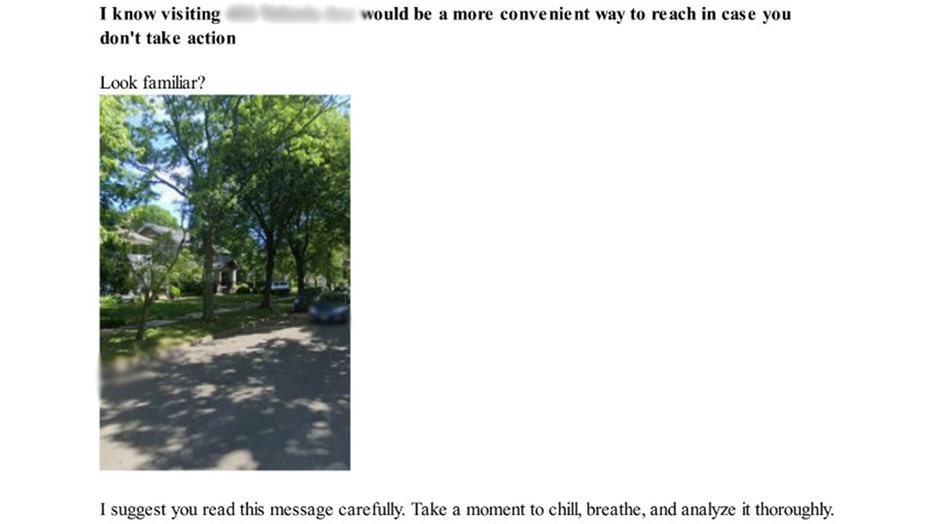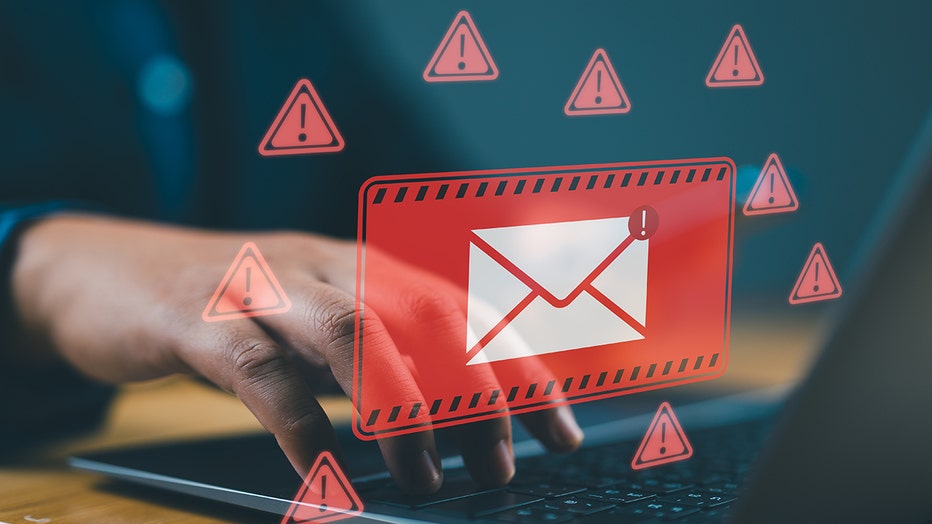Sextortion scams now feature photos of your home, personal information
Security experts are warning the public about an email scam that has taken on a disturbing new dimension, with perpetrators now providing personal information including photos of the recipient’s home.
The scam, known as "sextortion," now incorporates images of victims’ homes, sourced from online mapping services like Google Maps, to heighten the intimidation factor of their demands.
This week, emails were sent in to FOX Television Stations, showcasing the scams, which addressed the users by name and included images of their street and home address.
The beginning of the email includes the recipient’s full name and states, "Is visiting [recipient’s street address] a more effective way to contact if you don’t take action? Look familiar?" Below the message is a photo of the person’s street or home.

Email scam sent to recipient on September 3, 2024.
"It’s definitely written with a threatening tone," one person, who received the email scam, told FOX. "Anecdotally, I feel like I’m getting more scams in my Gmail these days, and the only reason I bothered to read this one was the image of my street at the top of the attachment."
Another anonymous person targeted told FOX, "Like many Americans, I’m used to receiving spam and phishing emails, but this one seemed next level. It contained my home address, email, phone number and a Google Street View image of my street, though it was mainly of my neighbor’s house. While most of that information is easy to uncover, it seemed like they went to great lengths to personally target me so it certainly set off some alarms and concern."

FILE: Email scams illustration (Credit: Getty Images)
The message purports to have been sent from a hacker who had compromised the recipient’s computer and used their webcam to record videos of them. The scammer threatens to release the video to all of the recipient’s contacts unless they pay a Bitcoin ransom.
In the cases sent to FOX, the demands are between $2,000-$2,200 payable by scanning a QR code embedded in the email. The emails state that recipients only have one day to submit a payment.
"I don't make mistakes, [recipient’s name]. If I suspect that you've shared or discussed this message with anyone else, the video will instantly start getting sent to your contacts," the email adds.
What is sextortion?
According to Krebson security, sextortion is a "serious crime that can lead to devastating consequences for victims."
Sextortion occurs when someone threatens to distribute a person’s private and sensitive material if they don’t provide the perpetrator with images of a sexual nature, sexual favors or money.
According to the FBI, officials have seen an increase in sextortion and financial sextortion cases.
In July, the company Meta said it had taken down about 63,000 Instagram accounts in Nigeria running sexual extortion scams and had removed thousands of Facebook groups and pages that were trying to organize, recruit and train new scammers.
What to do if you are a victim of a sextortion scam?
According to the FBI, predators are usually located outside the United States, primarily in West African countries (such as Nigeria and the Ivory Coast) or Southeast Asian countries (such as the Philippines).
They said predators are motivated by financial gain. They will request money transfers, gift cards, and even cryptocurrency.
RELATED: Artificial intelligence can detect 'sextortion' before it happens and help FBI: expert
Do not send any compromising images of yourself to anyone, no matter who they are or who they say they are. In addition, do not open any attachments from people you do not know. Also, turn off and cover any web cameras when you are not using them.
Anyone being exploited should report the predator’s account via the platform’s safety feature, block the predator who is contacting them, save the profile or messages, as those can help law enforcement identify and stop the predator.
If you, or someone you know, is being exploited, you can contact your local FBI field office, call 1-800-CALL-FBI, or report it online at tips.fbi.gov.

